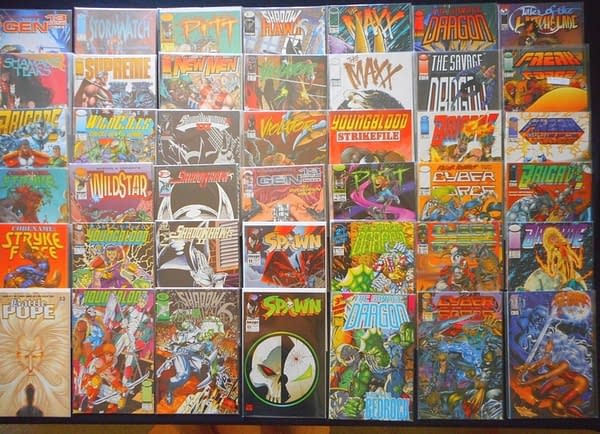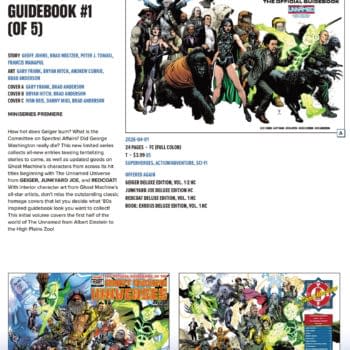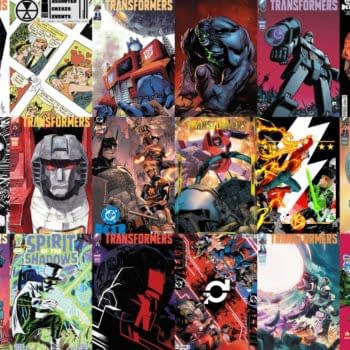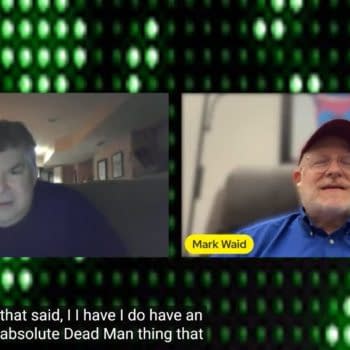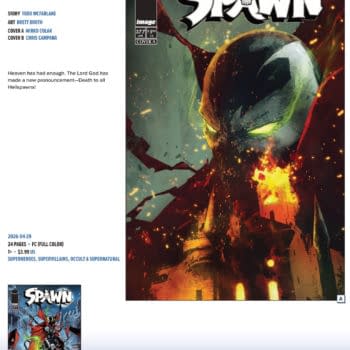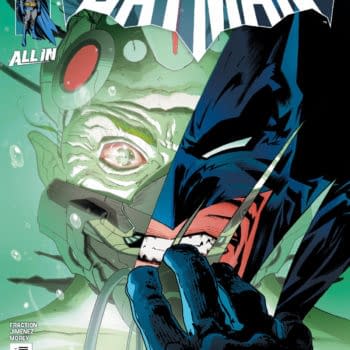Posted in: Comics | Tagged:
When Diamond Got to Return $4 Million Worth of Comics to Image
We ran Bill Schanes of Diamond Comic Distributors' memories of the Great Distributor Wars of 1995 earlier today. He also shared memories of the meetings with Image Comics over whether the publisher would go exclusively with Diamond or Capital City distributors to the direct market.
He wrote on Facebook about the late night meetings held during San Diego Comic-Con.
Since Capital City Distribution and Diamond Comic Distributors were in an all out battle as to which comic book publishers would go exclusive with one or the other, the Image Comics partners had asked for a series of one on one meeting with both of our companies during the San Diego Comic Convention. Capital City got the midnight to 2:00 AM meeting time slot and I got the 2:00 AM to whenever we finished time slot. I'm normally an early morning meeting guy, but this was really early for me (I usually start at 7:00 AM, and had several breakfast meetings that very morning – one at 7:00 AM and the next at 8:15 AM).
Bill sadly doesn't detail how those meetings went…
The scheduled meetings were held in a 2-story posh suite that Image Comics was using for the show.
When I entered the room where we ended up meeting in, it was really a large bedroom, with chairs pulled all around the bed (acting as a conference table). If that wasn't unusual, Rob Liefeld was fast asleep right in the middle of the bed.
This meeting was really a free flow of ideas, lots of concepts, give and takes, and gave me the opportunity to give an impromptu pitch about some of Diamond's unique strengths and advantages.
The Image partners were very open with their thoughts about both Capital and Diamond. On the Capital side, the partners really didn't like the Capital pitch made by Milton Griepp and John Davis, as Capital approached the publisher with pitches as if Capital had all the strength, almost dictating terms Image would have to accept, while Diamond's approach was just the opposite, I asked what the Image partners wanted, and we would do our best to get them as close to their goals as possible. I knew whomever DC, Dark Horse, Image and Valiant choose as their exclusive distributor, the other distributor would most likely either have to downsize dramatically or go out of business.
The meeting went on and on, but Rob never moved. It was a running joke during the meeting.
Is that what's called a sleeping partner?
As we were getting very close to finalizing the overall exclusive distribution agreement with the Image Comics partners, Chuck Parker, Diamond's Executive Vice President and I set up a meeting with the Image Comics partners at Rob Liefeld's Extreme Studios offices, I believe in the Anaheim, CA area (30 miles south of Los Angeles).
The meeting itself was a real contrast, as Chuck and I were there to listen to the Image Comics partners questions, thoughts, concerns, and hopefully finalize the contractual deal points, while the Image partners seemed to have several different agendas. These included the deal points, which Jim Lee and Todd McFarlane defiantly took the lead from the Image Comics side, and Rob chimed in several times with a couple of gestures and tidbits of commentary which appeared to us were an effort to showcase what the Image Comics partners were bringing to the table. In quick succession, Rob flexed his arm mussel and gave it a couple I hard slaps, and then tapped his forehead. I took this as a sign that Image had both sales strength, as well as the smarts to be in the room with us.
All through the meeting, almost all of the Image Comics partners were drawing. It made me smile.
It is the advantage that comic artists have over everyone else in the industry. Schanes then looked at how Image Comics was regarded in that industry.
In the early years of Image Comics, Image had many of the best selling titles, but not all of the Image Comics partners had their acts together in regards to how their publishing schedules were announced Vs the reality of late shipping books. 3 of the partners were really quite good and responsible, and the others really caused tremendous damage to the comic book specialty retailers, especially with late shipping books.
Diamond was taking a lot of heat from the retailers, rightfully so, and since I was the primary executive at Diamond who interacted with the Image Comics office, as well as the individual partner studios, I really tried to convey how damaging and out of control the late shipping books had gotten to all who were involved at the time.
After much discussion, the Image partners said we could announce that a large number of overdue, late shipping titles would be made fully returnable, cancelled, and or would be resolicited at a later date. Diamond has already scheduled a retailer meeting during the San Diego Comic Con, at a special event at the world famous San Diego Zoo. This announcement was met with a great relief from the retailers in attendance, as well as pretty much all retailers as soon as the news got around.
It wasn't until I got back to the Diamond offices after the comic con was over did I realize that well over $4 million dollars worth of Image Comics at Diamond's cost were cancelled, resolicited or made fully returnable. The dollar amount really struck home as to how important it was for Image Comics to do the right thing, even though not all of the partners were on board privately.
In the comments, Rob adds,
I can confirm the details of my sleeping through the meetings.
However, calling bullshit on Image damaging the specialty market. Always will always have. No more so than the fly by night publishers cashing in on the "trend", the disappointing non-event "events" from rivals that resulted in record unsold comics and the numerous gimmicks by competitors that were just lipstick on pig stunts that predictably backfired.
Bill replied,
I never mentioned which studios/partners were the main offenders on the late shipping books.
True, but he did specify Image Comics. Rob also clarified,
Just so it's clear, I was 100% on board with the books being returnable and or cancelled. In fact, Deathmate Red, a book of mine that ran late, I voluntarily re-solicited in order to adjust, we lost thousands of sales and the book shipped out at a more realistic number due to demand being we were late and at a prestige format price. This was the only late Deathmate book to do so. It was the right call. Enjoyed reading this, even though your sourcing contains some implied bias.
Bill added,
Diamond is in a difficult position, as we had exclusive contracts to represent the publishers (including Image Comics), but also wanted to protect the comic book specialty retailers from publishers who weren't releasing books as their solicitations indicated
James Friel pointed out,
One factor that no one ever mentions, but which publishers would all have had in teh uppermost levels of their minds was that Diamond always paid on time, while almost all other distributors were at times a bit slower–most were reliable, but not always the promptest.
Bill replied,
As the VP of Purchasing, the consistency of Diamond's on time payment record really helped with our day to day dealings with our suppliers, as traditionally, distributors in many different industries don't always pay on time. I know for me, this advantage was nice to have in my back pocket. Also, I always approached the huge advantage of Diamond's on time payments, as a huge leverage point, knowing it's always there to mention, but never having to mention it
Marti Stiver, then of Valiant/Acclaim wrote,
We didn't think Capital City Distribution could survive sans DC and Marvel, even if every other publisher signed a Capital City exclusive. "Shrinking a business is the most difficult challenge in business; it almost never works," someone told me at the time.
We had gotten wind of Marvel's plan, so that their big announcement came as no surprise. As I recall, we grabbed a train to Baltimore and a finalized a 7-point distribution deal in an hour or two. We knew the things we wanted shouldn't be in any way bad for Diamond or difficult to implement. That day a few people, especially you Bill, went out of your way to be empathetic with my position. On the train back to NYC, I felt pretty sick. While we did the right thing for Valiant, I had poured my guts into CCD for 6 years and still had 100 friends there.
Over beers with my many friends and colleagues in publishing, the often heard comment was the damage Connie Khoury, Capital's VP of Sales & Marketing–which included product sourcing, did in discussions with publishers. I don't think she had a warm or personal relationship with a single supplier.
More from Bill Schanes to come…


